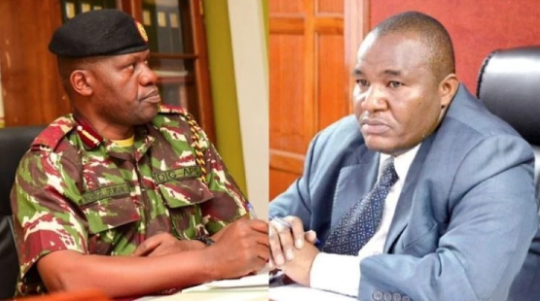Days after Justice Lawrence Mugambi ruled that acting Inspector General of Police Gilbert Masengeli should be sentenced to six months in jail for contempt of court, Masengeli’s security detail was withdrawn.
This move, often used by successive Kenyan governments and their operatives, appears to be an attempt to punish, intimidate, or control those who do not comply with official directives.
Justice Mugambi had given Masengeli six opportunities to explain the whereabouts of Jamil Longton, his brother Aslam Longton, and activist Bob Njagi. All three were reportedly abducted by individuals in unmarked cars believed to be police officers on August 19, 2024, during the Gen-Z protests.
Masengeli failed to appear in court despite his responsibility to enforce the law. Instead, he frequently posted photos online to show how occupied he was, possibly in an attempt to appease or challenge the court.
At one point, Masengeli even sent a deputy to court on his behalf, stating: “In a bid to comply with the orders, I assigned Deputy IG Eliud Lagat to attend Court on my behalf. It is not clear why the Court insisted on me attending to this matter in person, yet an equally senior officer had been availed by the Service. For the avoidance of doubt, the issues arising in the matter in Court were not personal to me.”
Despite Masengeli’s evasive tactics, Justice Mugambi, having exhausted all options, proceeded with the legal action. On Friday, September 13, 2024, the judge sentenced Masengeli to six months in prison for contempt and instructed him to report to the Commissioner General of Prisons to begin his sentence.
Justice Mugambi allowed for leniency, ruling that Masengeli could avoid serving the sentence if he appeared in court within seven days. If not, the sentence would come into effect.
It seems this decision upset the police chief, who then took action against Justice Mugambi. One moment the judge had a security detail, and the next, he was left unprotected, much like an ordinary citizen.
Chief Justice Martha Koome and the Judiciary expressed strong opposition to the withdrawal of Justice Mugambi’s security, citing concerns about judicial independence and retaliation.
“The act of withdrawing the security of a sitting Judge, following a judicial decision that displeased certain authorities, is deeply concerning,” Koome stated. “It sends a chilling message to the Judiciary and the public at large, that those entrusted with upholding justice and safeguarding our rights can be intimidated, bullied, or retaliated against for their rulings.”
She highlighted that such actions contravene Article 160 of the Constitution, which underscores the independence of the judiciary. “Retaliatory measures against judicial officers are uncalled for. The JSC calls for the national police to restore the security of Hon. Justice Mugambi,” she added.
In response, Masengeli issued a defiant statement, asserting his autonomy: “The responsibility for the independent command of the police is vested in the IG, and no person may give a direction to the IG with respect to the employment, assignment, promotion, suspension, or dismissal of any member of the National Police Service.”
Masengeli clarified that the two security officers previously assigned to Justice Mugambi were recalled for VIP security training and replaced with two VIP protection officers from the Judiciary Police Unit.
This situation echoes past events where security measures were used in politically charged contexts. For instance, during Uhuru Kenyatta’s regime, opposition leaders Raila Odinga and Kalonzo Musyoka had their bodyguards withdrawn before a major demonstration against the IEBC in 2017.
Similarly, Deputy Chief Justice Philomena Mwilu’s driver was shot in October 2017, just days before the presidential election rerun, highlighting a troubling pattern of using security as a tool of political manipulation.
Deputy CJ Philomena Mwilu’s driver, who was shot in the shoulder weeks after the Supreme Court’s landmark decision to nullify the August 8 General Election, sparked suspicion that the shooting was not a mere coincidence. The public was concerned that the attack was connected to the court’s ruling, adding to the tensions of the time.
President William Ruto also experienced a similar situation when he was Deputy President. In August 2021, amidst growing discord with President Uhuru Kenyatta, Ruto’s elite GSU security detail was replaced with Administration Police. This move generated significant controversy among Ruto’s allies, who perceived it as a deliberate attempt to undermine his security.
The official explanation for the change was that the GSU, which is tasked with guarding the President and State lodges, was not assigned to guard Ruto’s private residence in Karen. The Police Service Standing Orders stipulate that the GSU is designated for the President, Deputy President, State House, and State lodges.
Police spokesman Bruno Shioso characterized the redeployment as “normal,” but Ruto’s Communication Secretary David Mugonyi and his supporters argued that it compromised his safety.
The tension between Kenyatta and Ruto was exacerbated by accusations of sabotage and calls for resignation, further inflaming the situation. The judiciary’s concern over the recent withdrawal of Justice Mugambi’s security reflects a broader pattern where security measures are used in political maneuvers.
In June 2024, Makadara Law Courts Principal Magistrate Monica Kivuti was shot and killed by a senior police officer who was in court for the hearing of a case involving his wife.
After the shocking incident, CJ Koome later said it would enhance security measures and assured judicial staff and other court users of their safety and security.
The more things change, the more they remain the same and we are sure, this is not the last time VIP protection will be used to punish, intimidate people who do not seem to tow the line.



